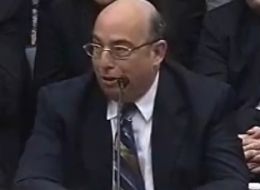Regulator: Before Banks Collapsed, They Pleaded With Feds To Let Them Fudge Their Books
Before financial institutions have collapsed over the past several months, they have come to the Financial Accounting Standards Board, pleading for a change in mark-to-market accounting rules so that they can continue to appear to be solvent on their balance sheets.
Robert Herz, head of the FASB, told a panel of lawmakers Thursday that the loudest critics of fair market accounting practices have been the very same banks that have gone belly up when regulators would not let them adjust their accounting.
"There seems to be a clamoring for changing mark-to-market rules that seems to come largely from institutions that may be insolvent," Rep. Alan Grayson (D-Fla.) said to Herz at a meeting of the Financial Services Subcommittee on Capital Markets, Insurance, and Government Sponsored Enterprises.
Grayson said that, from Herz' testimony, it seemed that "there may be institutions that are insolvent and they haven't been forced to write down their books to the point [of insolvency] yet, and those are maybe the same institutions that are asking us to modify the mark-to-market rules so that they won't have to admit that they're bankrupt. Is that correct?"
Herz said that it was.
"I share your point of view and I will tell you that I get calls and visits from some of those institutions that are now in government hands, about two weeks before they get taken over, trying to get the accounting changed," he said.
"Clearly some of the most vocal opponents of fair value and mark-to-market have been some of those institutions that ultimately failed and have had to have billions of taxpayer dollars put into them."
Mark-to-market accounting requires banks to value an asset at its most current market value. In a frozen market, where assets can't be sold for anything more than a fire-sale price, that value is extremely low, forcing banks to write-down a loss on their balance sheets. With a loss on the books, the bank can lend less money and is required to raise capital to meet regulatory lending standards. With enough losses on the books, the bank is no longer solvent.

The exchange comes at about the 4:40 mark in this video:
Grayson, reached in Florida, said the he was grateful for Herz' candidness and insisted that changing mark-to-market accounting rules was no way to get out of the current economic mess.
"That's representative of exactly the kind of thing that's put us in this position in general," he said. "We have people who break every rule in the book and then they think that the answer to their problems is to break more rules. It's given us some real insight into the human nature and the pathology of the people who have created these problems for America."
Just as the the institutions Herz referred to were requesting accounting changes, large banks are again calling for modifications.
"Why are we having this conversation now at all?" Grayson asked. "I think the real reason this has come up now is because a lot of the institutions are genuinely insolvent and don't want to admit it. The people who are in charge of those institutions don't want to have to give up their multimillion-dollar jobs and turn companies over to receivers who will see all the mistakes they have made."
For Grayson, the rules exist for a reason. "The reason why we have these
rules in the first place is to be able to distinguish the successful companies
from companies that are broke. That's why we have these rules. That's why we
have accounting," he said. "There's an underlying truth to accounting, and it's
very important to preserve that truth."














 Loading comments…
Loading comments… 






























March 13, 2009 06:47 PM